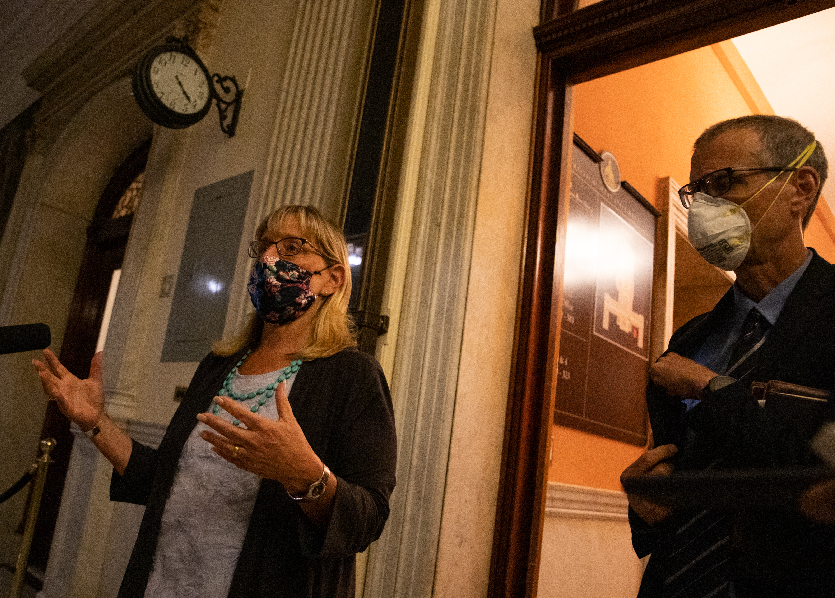Community
Massachusetts Senate approves police reform after overnight session

By Matt Murphy
State House News Service
JULY 13, 2020…..The Senate overcame a difficult rollout and several false starts to pass a far-reaching reform of policing in Massachusetts on Tuesday that would ban chokeholds, limit the use of tear gas, license all law enforcement officers and train them in the history of racism.
The vote in the upper chamber now shifts the focus of the debate over racism and policing to the House with just weeks left to finalize a bill that has vaulted to the top of the Legislature’s end-of-session agenda.
The Senate bill, which was developed after weeks of public protest around the country in response to the police killing of George Floyd in Minneapolis, would impose a new level of oversight on police that has been proposed for years on Beacon Hill, but has failed to gain traction until now.
It would also controversially scale back a legal protection for police and other public employees that currently shields them from civil lawsuits unless there was a clearly established violation of law. Democratic leaders, including U.S. Sen. Elizabeth Warren and U.S. Rep. Ayanna Pressley, weighed in to support the effort of Senate leaders to limit qualified immunity, while the state’s largest police union singled out that provision as one that would leave police officers second-guessing themselves on the job.
The Senate passed the bill 30-7 just after 4 a.m. on Tuesday after a long day of debate and an overnight session that spanned more than 17 hours. Voting against the bill were Democratic Sens. Nick Collins of Boston, Anne Gobi of Spencer, Michael Rush of Boston, John Velis of Westfield and Michael Moore of Millbury. They were joined in opposition by Republican Sens. Ryan Fattman of Sutton and Dean Tran of Fitchburg.
Senate Minority Leaders Bruce Tarr, Sen. Patrick O’Connor, a Weymouth Republican, and Sen. Diana DiZoglio, a Methuen Democrat, voted present.
Some senators offered sharp criticism of the process used to develop the bill, while others engaged in a spirited back-and-forth over the legal principles of qualified immunity and the need the act “urgently” to protect Black and other minority residents from discrimination.
“No one is saying that we don’t support our cops,” said Sen. Cindy Friedman, responding to critics who said the bill sought to punish police. But she pleaded with her fellow senators to show the same level of concern for everyone “shot, beaten or kicked” by police because of the color of their skin.
The thrust of the bill is to create a new independent commission – the Police Officer Standards and Accreditation Committee – that would certify all law enforcement officers and give the independent agency the power to renew, revoke or otherwise modify their licenses.
The new committee could also conduct investigations into allegations of misconduct, including the excessive use of force. Police would need to be recertified every three years, and the state would maintain a searchable database for police departments hiring new officers to review an applicant’s history.
The Massachusetts Coalition of Police, which represents 4,300 officers in 157 communities, supported the new licensing requirements, but raised objections to how quickly the bill was pushed through without a public hearing. Other groups representing minority law enforcement officers said they were excluded from the development of the bill.
“Not only am I a police officer, I am a black man and I am probably better able to speak to concerns of people of color than Senator (William) Brownsberger,” said Eddy Chrispin, president of Massachusetts Association of Minority Law Enforcement Officers.
The police union and other law enforcement groups called on the Senate to suspend its debate until a public hearing could be held, but that did not slow down lawmakers who continued to work their way through the dozens of amendments after days of setbacks.
Despite little disagreement over many of the core elements of the bill, the issue of qualified immunity for police became one of the central points of contention.
Senate leaders proposed new limits on qualified immunity, which if approved would make Massachusetts the second state after Colorado to increase the exposure of police officers to civil lawsuits to ensure they can be held accountable for their action on duty.
A Suffolk University poll in late June conducted for WGBH News, the News Service and other outlets found that 75 percent of Massachusetts residents think people should be able to sue police officers individually for misconduct, compared to just 18.2 percent who said they shouldn’t be able to sue.
Only 5.4 percent of people said they were undecided, according to the poll.
Sen. Brownsberger, a Belmont Democrat, told members that the proposed change would prevent cases where no clear violation of state law occurs from being thrown out of court based on qualified immunity.
Instead, it would allow for lawsuits to proceed if a police officer should have reasonably known their behavior violated someone’s civil rights, but it does not stop municipalities from indemnifying police or other public officials, thereby assuming the financial risk.
Several senators, including Sens. John Keenan and Marc Pacheco, said they still found the issue “confusing,” and not worth risking unintended consequences. “I know I owe them something more than, ‘I don’t know,'” Keenan said about what he would tell his constituents.
Opponents tried to rally behind a Sen. John Velis amendment that would have created a special commission to study and make recommendations on qualified immunity within 180 days, but that failed 16-24.
“This legislation does not eliminate qualified immunity, it rebalances it,” said Sen. Jo Comerford.
The final qualified immunity reform was approved on a 26-14 vote.
In the course of debate, Sen. Eric Lesser and Brownsberger both read from the recent Justice Department investigation documented alarming instances of police misconduct within the Springfield Police Department’s narcotic unit to remind their colleagues that Massachusetts is not immune from police misconduct.
“This report makes clear that serious reforms are not only essential, they are urgent,” Lesser said. “Violations are happening in our midst, in our commonwealth. There is practically a request by the Bill Barr Justice Department to to address these issues. We must act.”
House Speaker Robert DeLeo, in a statement early Monday evening, said he hoped to have a virtual hearing on the Senate bill this week. In a departure from the typical committee process, the House Ways and Means Committee and members of the House Judiciary Committee will jointly solicit feedback from lawmakers and other interested parties.
DeLeo said the unusual process was the result of the limited amount of time left in the formal legislative year, which is scheduled to end on July 31. The speaker’s emphasis on soliciting public feedback drew a clear contrast with the Senate’s process that had been criticized for days leading up to Monday’s vote.
“Despite a changed timetable, House leadership remains committed to working with the Black and Latino Legislative Caucus and House colleagues to take decisive action through omnibus legislation. We look forward to reviewing the Senate’s engrossed bill and the work ahead,” DeLeo said.
That the debate took place at all on Monday was a breakthrough for the Senate.
Sen. Ryan Fattman, a Sutton Republican, had postponed consideration of the bill during three consecutive sessions, including a rare Saturday session, to give senators more time to review the bill.
While some senators said they still felt rushed given the lack of a public hearing, Fattman and other critics of the bill allowed the debate to proceed.
Tran kicked off the Senate’s debate by delivering a scathing indictment of the process used to develop the bill, which he said was crafted by Democratic leaders without input from the public or key interest groups, including minority law enforcement officers.
The Fitchburg Republican, who is Vietnamese, said he has experienced “the kind of hatred and discrimination that one can only imagine or experience in their nightmares.” He called the bill “ill conceived and politically driven” and asked his mostly white colleagues, “What do you know about racial injustice and inequality?”
“The bill’s main goal and objective is to attack and discredit law enforcement,” Tran said.
But he wasn’t the only one to express concerns. Taunton Democrat Sen. Marc Pacheco stood up for Fattman and his right to use of parliamentary tactics to delay debate if he felt uncomfortable proceeding.
And while Pacheco said he agreed with 80 percent to 90 percent of what was in the bill, he and others raised concerns that changes to qualified immunity and limits on disciplinary appeals would circumvent the collective bargaining process and undermine a labor movement that had done much to protect the rights of Black and other minority workers.
“So it’s quarter past two in the morning and this is when we chose to take away collective bargaining rights. I don’t think I want to do that. No way,” Pacheco said, arguing in favor of Sen. Nick Collins amendment to restore some appeal options. It failed 16-24.
Pacheco also worried that the restrictions the bill would put on qualified immunity would apply to all public officials, not just police, exposing nurses, firefighters and other public officials to expensive and “frivolous” lawsuits, and adding to the legal costs for municipalities.
Tarr said the Senate might have done better to focus on common interests, like police licensing.
“If we can focus on what unites us rather than divides us, we can move forward in the next 18 days and get a bill to governor’s desk that he will sign,” Tarr said.
Baker last month filed his own legislation to create a system for licensing police and holding them accountable to a set of professional standards, but that bill is before the Committee on Public Safety and has not yet had a public hearing.
The debate did yield some changes to the bill, including a clarification filed by Tarr to make it clear that only law enforcement should have a duty to intervene if they witness police misconduct, not all bystanders.
Senate President Emerita Harriette Chandler successfully amended the bill to ask the new standards committee to create rules for police to respond to large gatherings and protests, with an emphasis on deescalation and minimal use of force.
And a Sen. Joan Lovely plan would require police departments to report purchases of military-grade equipment to the House and Senate for informational purposes.
Sen. Patricia Jehlen’s amendment blocking schools from sharing with law enforcement any information about a student’s immigration status, nation of origin, ethnicity, religion and known or suspected gang affiliations passed on a 27-12 vote.
Jehlen said it was intended to prevent students from being profiled. Black and Latinx students are more likely to be suspected of having gang involvement, she said, and that has been shown to have consequences in other proceedings, such as deportation hearings.
Jehlen and supporters said the amendment would not apply if an incident occurred or if there was an imminent threat, but Sen. James Welch said he worried the it would allow gangs to flourish in schools.
COMMUNITYMassachusetts Police Association releases statement on police reform bill






You must be logged in to post a comment Login